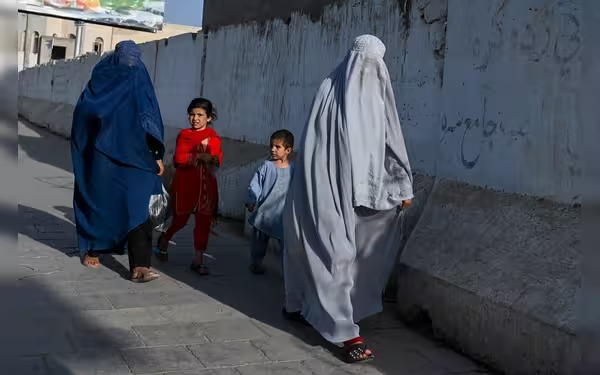Saturday, November 16, 2024 06:57 PM
New Taliban Law Further Restricts Afghan Women's Rights
- New law limits women's public participation and education.
- Women face increased challenges in daily life under Taliban rule.
- Taxi drivers instructed not to pick up women without male guardians.
 Image Credits: arabnewspk
Image Credits: arabnewspkThe new Taliban law imposes further restrictions on Afghan women's rights, limiting their education and public participation.
KABUL: The situation for Afghan women has become increasingly dire since the Taliban regained control of Afghanistan in August 2021. With the introduction of a new “vice and virtue” law, the already limited rights of women are facing further restrictions. This law has made it even more challenging for women to participate in public life, including education and employment.
Under the Taliban's rule, women have been systematically barred from attending secondary schools and universities, engaging in most forms of paid work, and traveling without a male family member. The only educational institutions still accessible to women are madrasas, which focus on religious training. However, even these institutions are becoming harder to access due to the new regulations.
Ayesha Azimi, a religious studies teacher, shared her struggles in navigating these new restrictions. She recounted a recent experience where she had to wait over an hour to find a taxi willing to take her to the madrasa. "The drivers didn’t want to give women a ride, fearing the Taliban. I had to call my husband to come and pick me up with his motorbike," she explained. This situation highlights the growing challenges women face in their daily lives.
Moreover, the Ministry of Propagation of Virtue and Prevention of Vice has instructed taxi drivers not to pick up women without a male guardian, threatening fines and punishment for non-compliance. This has left many women feeling devalued and marginalized in society. Azimi expressed her concerns, stating, "It feels like women have no value and contribution in society, while traditionally Islam gave women an important role and responsibility."
Jamila Haqmal, a 24-year-old woman living in Kabul, echoed these sentiments, emphasizing the dependency that the new restrictions create. "Some families don’t have a male caretaker at all," she said. This is particularly alarming given the high number of widows in Afghanistan due to decades of conflict. Women without male guardians are left with few options for support, leading to a precarious existence.
The new law has drawn comparisons to the harsh regulations imposed by the Taliban during their first rule in the late 1990s. After the US-led invasion in 2001, these restrictions were lifted, allowing women to reclaim their rights. However, with the Taliban's return to power, many of these oppressive measures are resurfacing.
According to political science professor Naseer Ahmad Nawidy, while the ideological framework of the Taliban remains unchanged, the implementation of the law may be somewhat less severe than in the past. He noted, "Even though the law has been ratified, they use a relatively mild approach in its implementation." However, the law's vague provisions and the discretionary power given to enforcers raise concerns about potential abuses.
The law covers various topics, including dress codes, travel, and media regulations, but its ambiguities leave room for multiple interpretations. Nawidy pointed out that the shift from decrees to a formal law could lead to even stricter enforcement, making life more difficult for women. The impact is already visible, as fewer families are seen visiting public parks.
The new “vice and virtue” law represents a significant setback for Afghan women, further entrenching their marginalization in society. As the situation continues to evolve, it is crucial for the international community to remain vigilant and advocate for the rights of women in Afghanistan. The resilience of Afghan women, despite these challenges, serves as a testament to their strength and determination to reclaim their rightful place in society.













